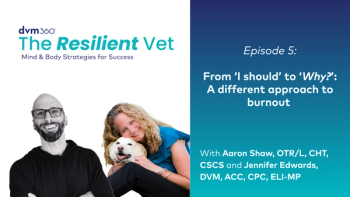
When helping others hurts you
Nearly 30 percent of practitioners are at risk for compassion fatigue. Would you recognize the symptoms and know what to do?
Most practices don't proactively prevent the stress that performing euthanasias causes team members and doctors, according to a February 2005 survey by
Another 22 percent say staff members talk about the issue themselves, but the practice doesn't offer any formal help. And only 12 percent of respondents say their practices address the issue at staff meetings and have taken proactive steps to prevent problems and/or help staff members struggling with euthanasia.
The fact that so few practices offer their team members support is taking a toll, according to a 2004 survey of 200 veterinary professionals conducted by the Humane Society of the United States (HSUS). Twenty-five percent of veterinary technicians list performing euthanasia as one of their top three sources of stress.
Robert Roop, Ph.D., vice president of Human Resources and Education at HSUS, has studied compassion fatigue for three years and is a certified Compassion Fatigue Specialist. Interestingly, the HSUS survey found little difference in the levels of compassion fatigue, burnout, and compassion satisfaction between male and female veterinarians. And results for all veterinary-practice team members were similar, though doctors, technicians, and front-office staff identified different sources of stress and satisfaction. (See Figure 1.) The effects of some of these stressors could cause compassion fatigue.
Figure 1 : A look at who stresses about what
Be on the lookout
Many situations can trigger compassion fatigue, such as caring for others more than you care for yourself; continuous exposure to a high-caring environment; inability to leave work at work; inability to prioritize; unclear successes; uncontrolled, recurring negative thoughts; role confusion; lack of outside interests; and poor self-care, according to Dr. Roop. Sound familiar? If so, check out Dr. Roop's list of common signs of compassion fatigue:
- frequently thinking about a client's traumatic experiences
- an obsessive, compulsive desire to help certain clients
- inability to let go of work-related matters while at home
- perception of survivors as fragile and needing the assistance of a caregiver
- thoughts and feelings of inadequacy as a caregiver
- perception of the world in terms of victims and perpetrators
- numbing of emotions while in the workplace
- loss of enjoyment in activities and cessation of self-care activities
- loss of energy
- loss of hope
- sense of dread about working with certain clients
- loss of sense of competence or potency
- isolation
- secretive self-medication or addiction to drugs
- relational dysfunction
- increased anxiety or frustration and anger
- difficulty concentrating or trouble sleeping
- change in weight/appetite.
If you suffer from any of these symptoms, don't ignore them. The condition is real, and the threat to your health is real. Fortunately, there's something you can do right away to avoid compassion fatigue.
"Establish a non-work-related activity, such as exercising, or take up a hobby you enjoy to break the negativity of the workplace routine," says Dr. Roop. "You need to evaluate what makes you feel positive and commit to that behavior to ward off the negative effects of compassion fatigue."
Newsletter
From exam room tips to practice management insights, get trusted veterinary news delivered straight to your inbox—subscribe to dvm360.





